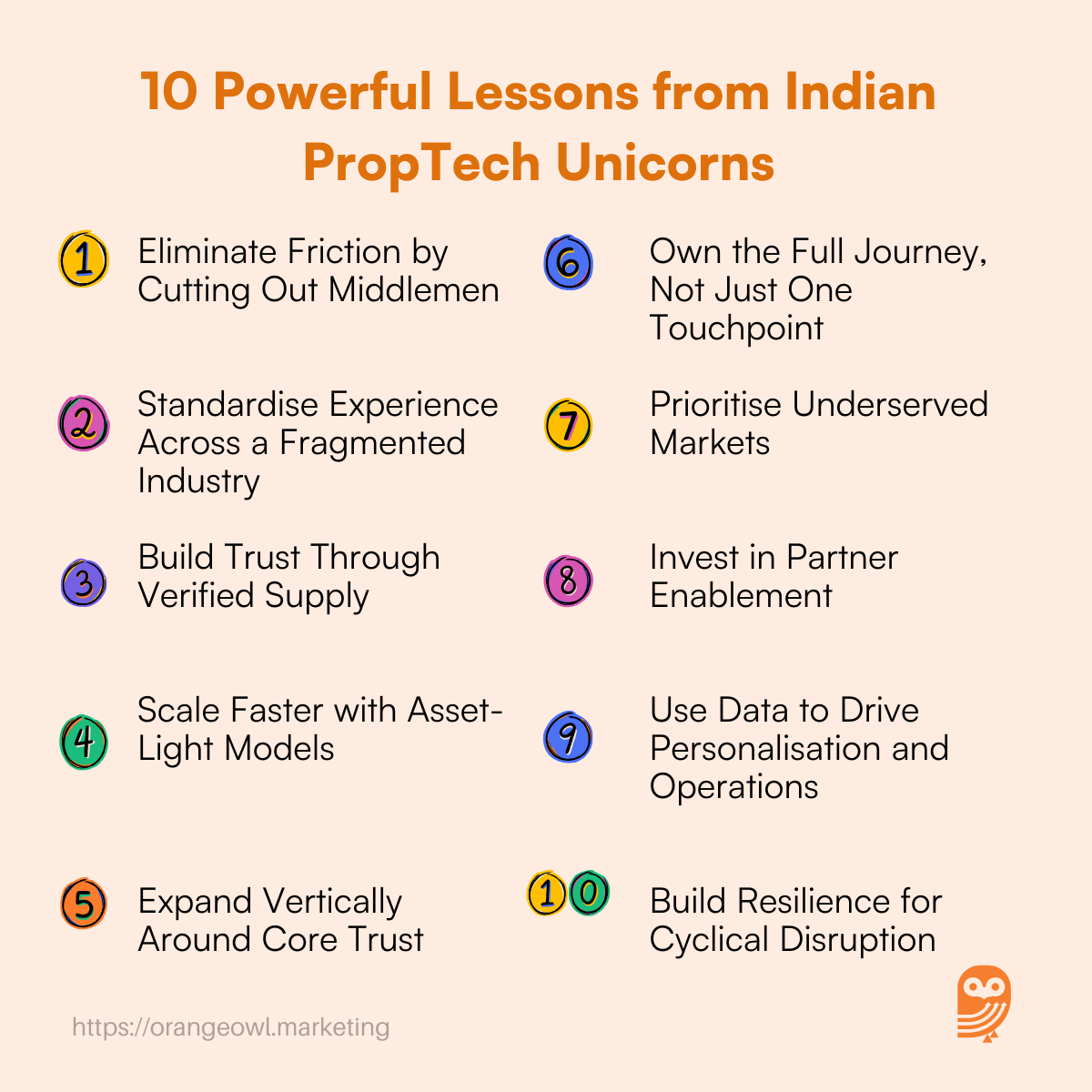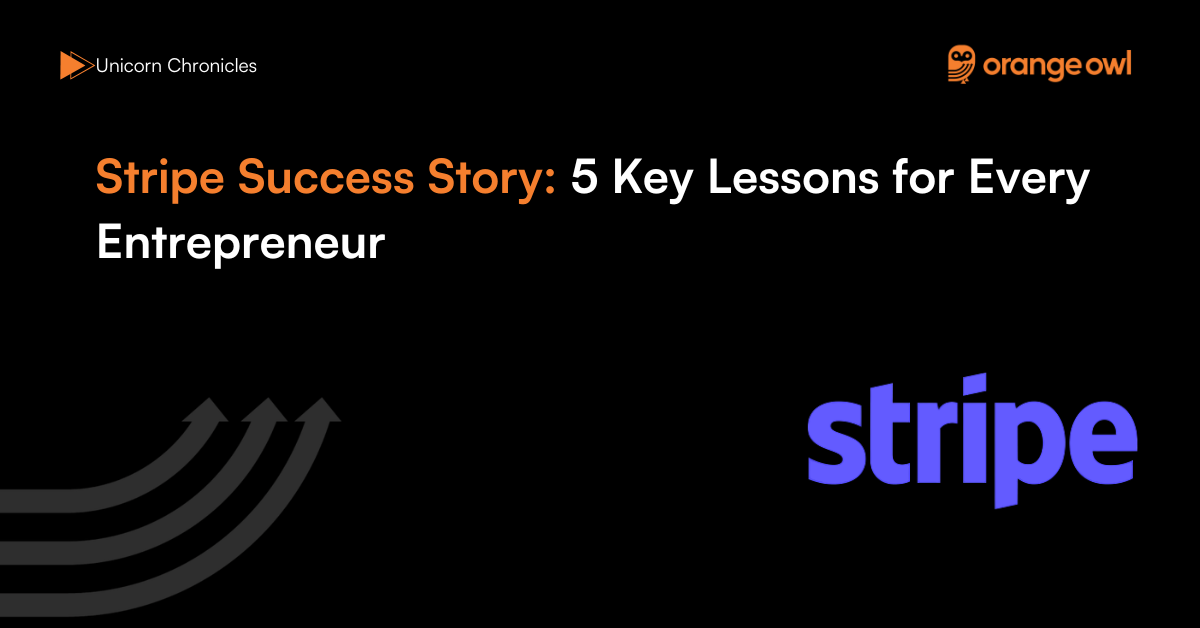10 Powerful Lessons from Indian PropTech Unicorns
Vivek Goel
June 26, 2025

Table of Contents
Introduction
India’s PropTech unicorns are transforming how people discover, transact, and live—whether it’s renting a home without a broker or booking standardised hotel rooms across cities. By solving deep-rooted inefficiencies in trust, access, and affordability, companies like NoBroker and Oyo have reshaped traditionally offline industries using smart technology and bold business models.
In a sector where real estate decisions are high-stakes and often riddled with friction, these startups have built scale by solving real user problems with empathy and innovation. From operational efficiency to user trust, their lessons hold relevance not just for real estate founders but for anyone building in complex, fragmented markets.
👉 Dive into the Oyo Success Story and the NoBroker Success Story
1. Eliminate Friction by Cutting Out Middlemen
Traditional property and rental markets in India are notorious for high broker commissions, hidden fees, and poor transparency. By removing intermediaries and creating direct owner-to-tenant platforms, PropTech startups simplified transactions and restored control to users.
Key Lesson: Removing non-value-adding middlemen not only reduces costs but also builds trust, transparency, and platform loyalty. If you can cut out friction and put power back in users’ hands, you create a long-term advantage.
2. Standardise Experience Across a Fragmented Industry
Hospitality and housing in India have long suffered from inconsistency across price, service quality, and hygiene. PropTech startups tackled this by defining clear standards, enforcing them via tech-enabled monitoring, and delivering predictable experiences across locations.
Key Lesson: Standardisation isn’t just about uniformity—it’s about building trust at scale. When customers know what to expect every single time, your brand becomes synonymous with reliability.
3. Build Trust Through Verified Supply
In both rentals and hospitality, users fear scams, fake listings, and surprise charges. PropTech platforms that introduced verified listings, identity checks, transparent pricing, and customer support earned user confidence in a market otherwise built on scepticism.
Key Lesson: In categories plagued by distrust, verified supply becomes a unique value proposition. Build a reputation as the most trustworthy place to transact, and user growth will follow.
4. Scale Faster with Asset-Light Models
Building in real estate doesn’t mean you have to own it. Startups have grown rapidly by using asset-light models—working with existing property owners, franchising hotels, or aggregating supply, and layering technology to ensure consistent delivery.
Key Lesson: Ownership isn’t a prerequisite for scale. When you combine technology with smart partnerships, you can grow fast without being weighed down by heavy capital.
5. Expand Vertically Around Core Trust
Once a PropTech brand becomes the go-to for rentals or hotel bookings, the opportunity to expand into adjacent services—like home loans, relocation, home maintenance, or property management—becomes not just possible, but natural.
Key Lesson: First, win deep trust in one core offering. Once you’ve earned that, expand your value chain by solving related pain points—turning a single-transaction platform into a lifecycle solution.

6. Own the Full Journey, Not Just One Touchpoint
Real estate decisions span months and involve multiple steps—search, shortlisting, verification, negotiation, financing, documentation, and post-move services. The most successful PropTech platforms designed their ecosystems to cover as many of these as possible.
Key Lesson: The more parts of the journey you can own, the more value (and revenue) you create. Don’t just be a discovery tool—become a trusted partner from start to finish.
7. Prioritise Underserved Markets
Urban India may have been the first to go digital, but smaller towns have even greater need for trustworthy property services. By designing offerings for Tier 2 and Tier 3 cities—where brokers are dominant and information is scarce—PropTech players built deep loyalty and strong word-of-mouth.
Key Lesson: Tier 2/3 markets are not secondary—they are the next frontier. If you understand their unique challenges and build with empathy, you unlock a scale few competitors can match.
8. Invest in Partner Enablement
Your customer experience is only as good as your weakest hotel or landlord. That’s why leading PropTech startups invest heavily in onboarding, training, and empowering their supply-side partners with dashboards, incentives, and clear SLAs.
Key Lesson: Great tech alone doesn’t guarantee great service. To scale reliably, you need motivated and aligned partners, so invest in enabling and retaining them.
9. Use Data to Drive Personalisation and Operations
PropTech unicorns leverage data not just to match users with homes or rooms, but also to optimise pricing, track seasonal trends, personalise recommendations, and flag underperforming supply. Data becomes the invisible engine behind UX and operations.
Key Lesson: Data isn’t just for dashboards—it’s a tool for continuous improvement. Use it to personalise journeys, balance supply and demand, and scale operations efficiently.
10. Build Resilience for Cyclical Disruption
Real estate and travel are deeply cyclical and sensitive to events like pandemics, economic slowdowns, or regulatory changes. The companies that survive are those that stay lean, adapt business models (like hybrid or co-living), and prioritise cash discipline over vanity metrics.
Key Lesson: Growth is great, but resilience is essential. Build a business that can weather uncertainty and bounce back stronger from shocks.
Conclusion
Indian PropTech unicorns have gone beyond digitising real estate—they’ve fundamentally transformed how people search, stay, and settle. Whether it’s creating a broker-free rental revolution or standardising budget hospitality across the country, these startups have reimagined the property experience through technology, trust, and relentless execution.
If you’re building in a complex or fragmented space, these stories offer powerful takeaways: build trust as your foundation, solve deeply felt user pain, scale with partner alignment, and never stop listening to the market.
👉 Dive into more Unicorn insights at orangeowl.marketing/unicorn-chronicles


